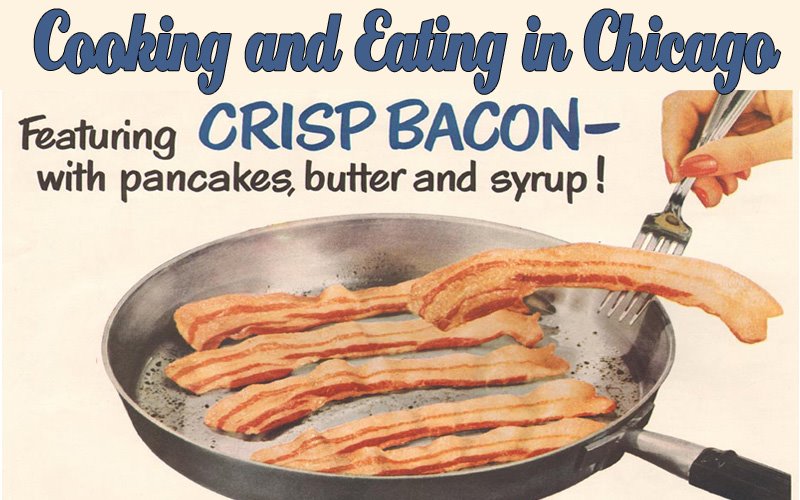
I've written quite a few times about my disdain for recipes. I believe that recipes are a crutch that prevent people from learning how to actually cook.
For the most part, they're unnecessary. There are some exceptions, of course, but the overwhelming majority of recipes are simple techniques embellished with multiple flavor variations.
Case in point--my mother in law. She's a damn good cook who stows a file folder full of clipped recipes in her giant suitcase every time she comes for a visit. I snuck a look at it a few weeks ago, and, among other things, there were eight separate recipes for bread pudding and baked french toast. Eight different recipes for her to keep track of, all variations on exactly the same theme; some type of bread soaked with custard, with some sort of flavor and/or add-ins like fruit or nuts, which is then baked in a shallow dish.
She clearly likes this concept; she's making eight different versions of it. Think of the possibilities that might open up to her if she were to ditch the recipes and embrace the (really, very simple) techniques that these recipes are built around.
Most cooking simply involves hanging various ingredients on a template or skeleton. All the recipe does is name the specific ingredients involved, rather than leave that choice up to you. The great, gaping knowledge gap, which is what distinguishes cooks from recipe-followers, is an understanding of the template and how it works, and the realization that the options of what kind of bread to use, which flavors to add, and whether to use dried cranberries or raisins are infinitely malleable and really, rather arbitrary.
So let's take a look at one of my mother in law's bread pudding recipes--Cranberry Orange Bread Pudding--as an example. The template for this recipe is simple:
Bread + Custard + Flavorings + Other stuff + Bake it.
The only real knowledge one needs is what a custard is and how to work with it. Everything else is completely variable.
Here are the ingredients from this recipe, and, in paranthesis, the role they play in the template:
King's Hawaiian Bread (Bread)
Whole Eggs (Custard)
Additional Egg Yolks (Custard)
Milk (Custard)
Sugar (Flavorings)
Orange Juice (Flavorings)
Orange Zest (Flavorings)
Grand Marnier (Flavorings)
Vanilla Extract (Flavorings)
Dried Cranberries (Other Stuff)
Whole Eggs (Custard)
Additional Egg Yolks (Custard)
Milk (Custard)
Sugar (Flavorings)
Orange Juice (Flavorings)
Orange Zest (Flavorings)
Grand Marnier (Flavorings)
Vanilla Extract (Flavorings)
Dried Cranberries (Other Stuff)
So, by simply pulling back, understanding the role each ingredient plays in the dish, and then considering all the other various ingredients that can play the same role, you can write forty bread pudding recipes in about five minutes. Think about it:
Bread--how many different types of bread could you use? Brioche, wheat bread, challah, crusty baguettes, cinnamon-raisin bread, focaccia, cinnamon rolls, doughnuts, banana bread, sourdough...the list is endless. How about a savory bread pudding with rye bread, caraway, crispy bacon, apples, and sauerkraut? Sounds weird, but that might be a pretty cool little side dish for grilled pork chops, no?
Flavorings--Again, the list is endless. Orange, lemon, lime, vanilla, chocolate, maple, honey, every extract you can think of, every liqueur you can think of, coconut milk instead of regular milk, savory, sweet, sweet and savory, etc, etc. Think of flavors that go together and reconfigure them into the familiar framework of the bread pudding. How about a key lime bread pudding with key lime juice, lime zest, and a rich bread like brioche with bits of broken graham crackers mixed in? Peanut Butter and Jelly Bread Pudding. Bananas Foster Bread Pudding. It's literally endless.
Add-ins--Nuts, chocolate chips, dried fruit, fresh fruit, cooked fruit, crunchy toffee bits, candy, vegetables for savory (or sweet, I suppose) bread puddings....
The only thing that might be even slightly unfamiliar here is the custard. But making custard is just a question of knowing the correct ratio of eggs/yolks to liquid.
That concept--of using ratios in cooking--is the subject of a new book about cooking (I'm not calling it a cookbook) by Michael Ruhlman. I'm a big fan of Ruhlman for both his excellent writing and the way he attempts to de-mystify cooking in his books. I haven't read or even checked out this book yet, but based on his other books (The Elements of Cooking is a really great resource for budding cooks), and the concept, I think it's bound to be good.
is a really great resource for budding cooks), and the concept, I think it's bound to be good.
The book is called Ratio: The Simple Codes Behind the Craft of Everyday Cooking and the concept is similar to what I've described above. Ditch the recipes and begin understanding the simple underlying principles on which recipes are based. Then just mix and match the ingredients of your choice based on what you have on hand or what you feel like eating.
and the concept is similar to what I've described above. Ditch the recipes and begin understanding the simple underlying principles on which recipes are based. Then just mix and match the ingredients of your choice based on what you have on hand or what you feel like eating.
Ruhlman's book furnishes some of the basic ratios for various types of breads, quick breads, stocks, sauces, and, yes...custards, and allows readers begin to understand the basic principles of cooking in the same way that chefs approach the process. Alton Brown says that "having a ratio in hand is like having a secret decoder ring that frees you from the tyranny of recipes", and he's right, despite employing his typical science-geek frame of reference. It's a book I plan on reading because I enjoy Ruhlman's writing and the fresh approach he brings to the subject matter, but I'm even more interested in recommending it to novice cooks.
 Ruhlman's blog has a post up about the book, and he's doing a giveaway promotion, in conjuction with Share Our Strength, which is a wonderful organization. Anyone who donates--regardless of the amount--by clicking through to Ruhlman's page on SOS will be eligible for the giveaway. You can win signed copies of the book, a fancy scale, and some other cool stuff, so I encourage everyone to check it out.
Ruhlman's blog has a post up about the book, and he's doing a giveaway promotion, in conjuction with Share Our Strength, which is a wonderful organization. Anyone who donates--regardless of the amount--by clicking through to Ruhlman's page on SOS will be eligible for the giveaway. You can win signed copies of the book, a fancy scale, and some other cool stuff, so I encourage everyone to check it out.
Charities like SOS typically see a big decline in donations during trying economic times like this, so it's important to keep them in mind while we're all figuring out ways of cutting back and being more frugal. Think of it this way; learning to cook will actually save you money by allowing you to more easily utilize what's in your pantry or is on sale, and you can use some of the money you save with your newfound culinary skills to help feed hungry kids. Plus, you might even win a cool prize.
Bread--how many different types of bread could you use? Brioche, wheat bread, challah, crusty baguettes, cinnamon-raisin bread, focaccia, cinnamon rolls, doughnuts, banana bread, sourdough...the list is endless. How about a savory bread pudding with rye bread, caraway, crispy bacon, apples, and sauerkraut? Sounds weird, but that might be a pretty cool little side dish for grilled pork chops, no?
Flavorings--Again, the list is endless. Orange, lemon, lime, vanilla, chocolate, maple, honey, every extract you can think of, every liqueur you can think of, coconut milk instead of regular milk, savory, sweet, sweet and savory, etc, etc. Think of flavors that go together and reconfigure them into the familiar framework of the bread pudding. How about a key lime bread pudding with key lime juice, lime zest, and a rich bread like brioche with bits of broken graham crackers mixed in? Peanut Butter and Jelly Bread Pudding. Bananas Foster Bread Pudding. It's literally endless.
Add-ins--Nuts, chocolate chips, dried fruit, fresh fruit, cooked fruit, crunchy toffee bits, candy, vegetables for savory (or sweet, I suppose) bread puddings....
The only thing that might be even slightly unfamiliar here is the custard. But making custard is just a question of knowing the correct ratio of eggs/yolks to liquid.
That concept--of using ratios in cooking--is the subject of a new book about cooking (I'm not calling it a cookbook) by Michael Ruhlman. I'm a big fan of Ruhlman for both his excellent writing and the way he attempts to de-mystify cooking in his books. I haven't read or even checked out this book yet, but based on his other books (The Elements of Cooking
The book is called Ratio: The Simple Codes Behind the Craft of Everyday Cooking
Ruhlman's book furnishes some of the basic ratios for various types of breads, quick breads, stocks, sauces, and, yes...custards, and allows readers begin to understand the basic principles of cooking in the same way that chefs approach the process. Alton Brown says that "having a ratio in hand is like having a secret decoder ring that frees you from the tyranny of recipes", and he's right, despite employing his typical science-geek frame of reference. It's a book I plan on reading because I enjoy Ruhlman's writing and the fresh approach he brings to the subject matter, but I'm even more interested in recommending it to novice cooks.
 Ruhlman's blog has a post up about the book, and he's doing a giveaway promotion, in conjuction with Share Our Strength, which is a wonderful organization. Anyone who donates--regardless of the amount--by clicking through to Ruhlman's page on SOS will be eligible for the giveaway. You can win signed copies of the book, a fancy scale, and some other cool stuff, so I encourage everyone to check it out.
Ruhlman's blog has a post up about the book, and he's doing a giveaway promotion, in conjuction with Share Our Strength, which is a wonderful organization. Anyone who donates--regardless of the amount--by clicking through to Ruhlman's page on SOS will be eligible for the giveaway. You can win signed copies of the book, a fancy scale, and some other cool stuff, so I encourage everyone to check it out.Charities like SOS typically see a big decline in donations during trying economic times like this, so it's important to keep them in mind while we're all figuring out ways of cutting back and being more frugal. Think of it this way; learning to cook will actually save you money by allowing you to more easily utilize what's in your pantry or is on sale, and you can use some of the money you save with your newfound culinary skills to help feed hungry kids. Plus, you might even win a cool prize.






2 comments:
Pork with apple and bacon bread and butter pudding - well that sounds good.
I'm making choux buns. I think I'll stick to the recipe.
I agree that recipes are generally unnecessary, but I still enjoy them. Why?
For inspiration - I might see an ingredient I wouldn't have thought of or a different technique for doing something.
For entertainment - Cookbooks and recipes are like novels to me, revealing information about the author, history, and geography that they came out of (I have a whole collection of cookbooks from my time as a traveling personal chef...regional and deliciously fun.)
For baking - Because there are few things I make every day, I need a reference point for baking where small amounts of leavening, etc., may change my whole product.
I like recipes, but agree that people rely on them too much and "clip" ones that they don't need (myself included).
Post a Comment